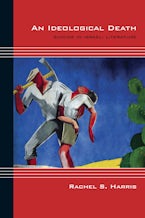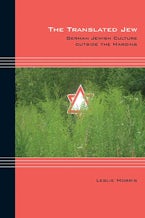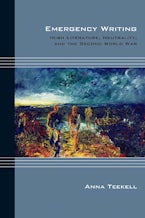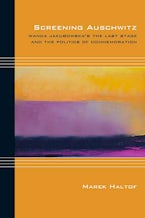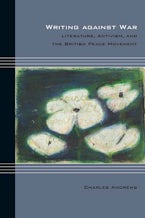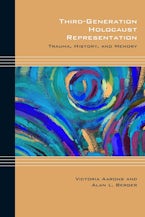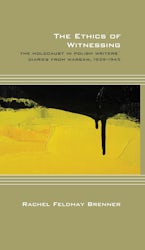Cultural Expressions of World War II
 Cultural Expressions of World War II publishes scholarly works that respond to the years of crisis before World War II, the global war itself, the Holocaust, and to past and present memories and memorializations of the 1930s and 1940s. The goal of the series is to enhance interest in each of these subjects by providing enriching interdisciplinary linkages among them from various perspectives and locations: local, national, international, and transnational.
In addition to literary representations, this series’ interdisciplinary approach includes studies of biography and autobiography, testimony as narrative, film, theater, and dance, along with photography and the visual arts, music, journalism, propaganda, and architecture.
Series editor: Phyllis Lassner
Cultural Expressions of World War II publishes scholarly works that respond to the years of crisis before World War II, the global war itself, the Holocaust, and to past and present memories and memorializations of the 1930s and 1940s. The goal of the series is to enhance interest in each of these subjects by providing enriching interdisciplinary linkages among them from various perspectives and locations: local, national, international, and transnational.
In addition to literary representations, this series’ interdisciplinary approach includes studies of biography and autobiography, testimony as narrative, film, theater, and dance, along with photography and the visual arts, music, journalism, propaganda, and architecture.
Series editor: Phyllis Lassner Showing results 1-10 of 14
Filter Results OPEN +

An Ideological Death
An Ideological Death: Suicide in Israeli Literature examines literary challenges to Israel’s national narratives. Many prominent Israeli fiction writers use the prism of suicide to confront the centrality of the army, the mythology of the “new Jew,” the vision of Tel Aviv as the first Israeli city, and the very process by which a nation’s history is constructed.
The Translated Jew
The Translated Jew releases the category of German Jewish text from the strictures of a national literature and reimagines the transnational potential for German Jewish culture in the twenty-first century.
Emergency Writing
Anna Teekell’s Emergency Writing examines the responses of Irish writers to World War II, demonstrating how Irish late modernism emerged with the Free State’s political independence. Key writers studied include Beckett, Bowen, MacNeice, and O’Brien.
Screening Auschwitz
Screening Auschwitz is the first and definitive discussion of the classic Polish Holocaust film The Last Stage (Ostatni etap). Directed by Auschwitz survivor Wanda Jakubowska, The Last Stage was the first film of its kind. Marek Haltof has incorporated a wealth of new sources to trace the creation of this unique film and its wide influence on later films about the Holocaust and popular images of the Shoah.
Writing against War
Writing against War combines peace studies and literary criticism to offer a unique examination of experimental British fiction devoted to peace activism in the interwar period.
Third-Generation Holocaust Representation
In Third-Generation Holocaust Representation Victoria Aarons and Alan L. Berger address evolving notions of “postmemory”; the intergenerational and ongoing transmission of trauma; issues of Jewish cultural identity; inherited memory; the psychological tensions of post-Holocaust Jewish identity; the characteristic tropes of memory and the personalized narrative voice; issues of generational dislocation and anxiety; the recurrent antagonisms of assimilation and historical alienation; the imaginative re-creation and reconstruction of the past; and the future of Holocaust memory and representation.
Spoiling the Stories
Spoiling the Stories by Tamar Merin is based on the theoretical idea of intersexual dialogue, a term that refers to the various literary strategies employed by Israeli female fiction writers expressing their voice within a male-dominated and (still) inherently Oedipal literary tradition.
Young Lions
Finalist, 2015 National Jewish Book Awards in the American Jewish Studies category
Young Lions: How Jewish Authors Reinvented the American War Novel shows how Jews, traditionally castigated as weak and cowardly, for the first time became the popular literary representatives of what it meant to be a soldier and what it meant to be an American.
The Ethics of Witnessing
Winner, 2015 USC Book Award in Literary and Cultural Studies, for outstanding monograph published on Russia, Eastern Europe or Eurasia in the fields of literary and cultural studies, The Ethics of Witnessing investigates the reactions of five important Polish diaristswriters—Jaroslaw Iwaszkiewicz, Maria Dabrowska, Aurelia Wylezynska, ZofiaNalkowska, and Stanislaw Rembek—during the period when the Nazis persecuted and murdered Warsaw’s Jewish population.
Hidden in Plain Sight
Hidden in Plain Sight: Jews and Jewishness in British Film, Television, and Popular Culture is the first collection of its kind on this subject. The volume brings together a range of original essays that address different aspects of the role and presence of Jews and Jewishness in British film and television from the interwar period to the present.

An Ideological Death
An Ideological Death: Suicide in Israeli Literature examines literary challenges to Israel’s national narratives. Many prominent Israeli fiction writers use the prism of suicide to confront the centrality of the army, the mythology of the “new Jew,” the vision of Tel Aviv as the first Israeli city, and the very process by which a nation’s history is constructed.
The Translated Jew
The Translated Jew releases the category of German Jewish text from the strictures of a national literature and reimagines the transnational potential for German Jewish culture in the twenty-first century.
Emergency Writing
Anna Teekell’s Emergency Writing examines the responses of Irish writers to World War II, demonstrating how Irish late modernism emerged with the Free State’s political independence. Key writers studied include Beckett, Bowen, MacNeice, and O’Brien.
Screening Auschwitz
Screening Auschwitz is the first and definitive discussion of the classic Polish Holocaust film The Last Stage (Ostatni etap). Directed by Auschwitz survivor Wanda Jakubowska, The Last Stage was the first film of its kind. Marek Haltof has incorporated a wealth of new sources to trace the creation of this unique film and its wide influence on later films about the Holocaust and popular images of the Shoah.
Writing against War
Writing against War combines peace studies and literary criticism to offer a unique examination of experimental British fiction devoted to peace activism in the interwar period.
Third-Generation Holocaust Representation
In Third-Generation Holocaust Representation Victoria Aarons and Alan L. Berger address evolving notions of “postmemory”; the intergenerational and ongoing transmission of trauma; issues of Jewish cultural identity; inherited memory; the psychological tensions of post-Holocaust Jewish identity; the characteristic tropes of memory and the personalized narrative voice; issues of generational dislocation and anxiety; the recurrent antagonisms of assimilation and historical alienation; the imaginative re-creation and reconstruction of the past; and the future of Holocaust memory and representation.
Spoiling the Stories
Spoiling the Stories by Tamar Merin is based on the theoretical idea of intersexual dialogue, a term that refers to the various literary strategies employed by Israeli female fiction writers expressing their voice within a male-dominated and (still) inherently Oedipal literary tradition.
Young Lions
Finalist, 2015 National Jewish Book Awards in the American Jewish Studies category
Young Lions: How Jewish Authors Reinvented the American War Novel shows how Jews, traditionally castigated as weak and cowardly, for the first time became the popular literary representatives of what it meant to be a soldier and what it meant to be an American.
Young Lions: How Jewish Authors Reinvented the American War Novel shows how Jews, traditionally castigated as weak and cowardly, for the first time became the popular literary representatives of what it meant to be a soldier and what it meant to be an American.
The Ethics of Witnessing
Winner, 2015 USC Book Award in Literary and Cultural Studies, for outstanding monograph published on Russia, Eastern Europe or Eurasia in the fields of literary and cultural studies, The Ethics of Witnessing investigates the reactions of five important Polish diaristswriters—Jaroslaw Iwaszkiewicz, Maria Dabrowska, Aurelia Wylezynska, ZofiaNalkowska, and Stanislaw Rembek—during the period when the Nazis persecuted and murdered Warsaw’s Jewish population.
Hidden in Plain Sight
Hidden in Plain Sight: Jews and Jewishness in British Film, Television, and Popular Culture is the first collection of its kind on this subject. The volume brings together a range of original essays that address different aspects of the role and presence of Jews and Jewishness in British film and television from the interwar period to the present.

